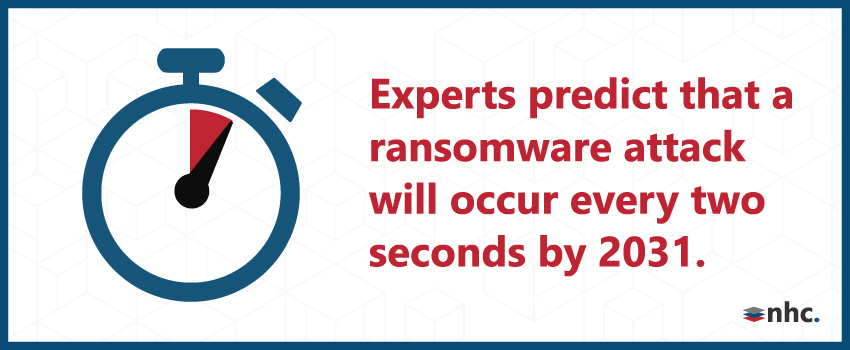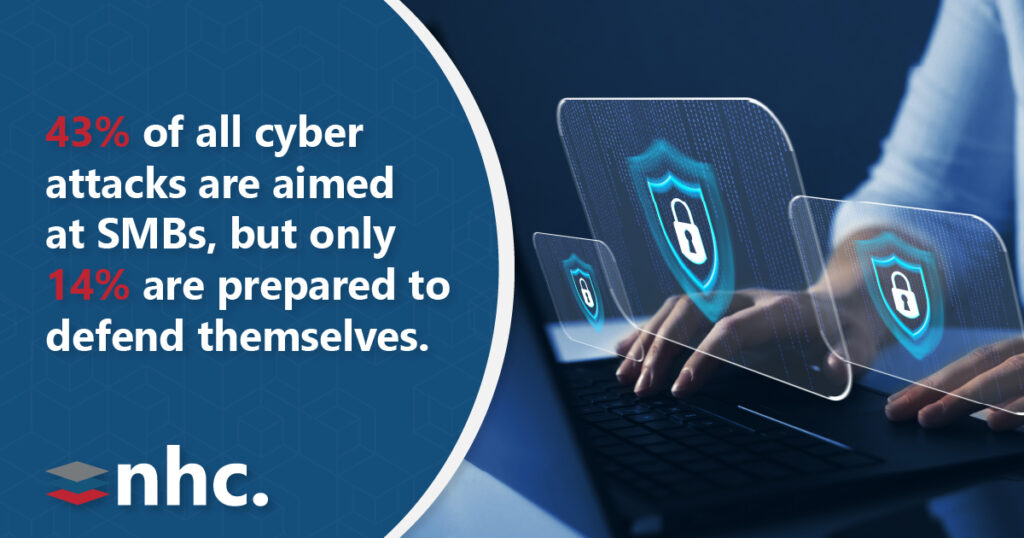Top 6 Cyber Security Risks for SMBs in 2023
Cyber attacks targeting small- to medium-sized businesses (SMBs) are becoming more frequent – and more complex. While 43% of all cyber attacks are aimed at SMBs, only 14% are prepared to defend themselves.1 And considering SMBs spend an average of $120,000 to $1.24M on data breaches,2 ensuring your organization can fight a cyber attack is likely a top priority.
Staying aware of cyber security trends is key to keeping your business protected. Read on to learn about the top risks for SMBs to watch out for in 2023 and beyond:
1. Phishing
Phishing attacks – social engineering attacks where a bad actor pretends to be a trusted contact and tricks an employee into revealing sensitive information or installing malware – are the most widespread threat facing SMBs today. Phishing attacks increased by 61% in 2022,3 and employees at small businesses are a frequent target since they aren’t typically well-trained at identifying these attempts.
2. Malware
Malware, short for malicious software, can damage, disrupt, or provide unauthorized access to an organization’s computer systems or networks. SMBs are often victims of malware attacks due to having limited cybersecurity resources, so putting strong defenses in place can help to keep your business safe.
3. Ransomware
Ransomware is a type of malware that encrypts an organization’s data and demands a ransom in exchange for decryption. SMBs are especially vulnerable to these attacks since they may not have backup solutions or a dedicated IT team to respond quickly. Experts predict a ransomware attack will occur every two seconds by 2031,4 so implementing measures to mitigate this growing threat now is essential.

4. Weak Passwords
Despite many business leaders being familiar with password security best practices, weak passwords are still a major threat to SMBs. Employees using easy-to-guess passwords or the same passwords for multiple accounts can result in hackers accessing your critical systems and sensitive information. And since 32% of people worldwide reuse passwords across five to ten websites,5 it may be time to implement stronger password policies.
5. Outdated Software
Many SMBs use various software and web applications, such as customer relationship management (CRM) systems, accounting software, and content management systems, to keep business operations running. Because software is often prone to vulnerabilities, failing to install patches or updates regularly could expose your network to hackers.
6. Insider Threats
While the threat isn’t always intentional, employees and contractors can harm your business as insider threats. Unfortunately, 82% of breaches last year involved the human element – including malicious activities and accidental misuse.6 Since many SMBs lack proper access controls and monitoring systems, detecting and preventing insider threats can be tricky.
Safeguard Your SMB With NHC’s Managed Security Services
Cyber attacks aren’t just a concern for “big businesses,” as the statistics above show. But as more SMBs adopt remote work environments and cloud-based platforms, securing increasingly complex networks is more difficult than ever.
NHC’s managed security services provide businesses with everything you need to keep your networks and customer data safe. Our all-in-one approach to managed security includes:
- Cloud-native security platforms
- Next-generation firewalls
- Remote access protection
- Advanced threat monitoring
Ready to secure your network? Reach out to NHC today to get started with our managed security services.
Sources:
- https://www.forbes.com/sites/chuckbrooks/2022/01/21/cybersecurity-in-2022–a-fresh-look-at-some-very-alarming-stats/?sh=65397a406b61
- https://purplesec.us/resources/cyber-security-statistics/
- https://www.cnbc.com/2023/01/07/phishing-attacks-are-increasing-and-getting-more-sophisticated.html
- https://cybersecurityventures.com/global-ransomware-damage-costs-predicted-to-reach-250-billion-usd-by-2031/
- https://bitwarden.com/resources/world-password-day-global-survey-full-report
- https://www.verizon.com/business/en-gb/resources/2022-data-breach-investigations-report-dbir.pdf



